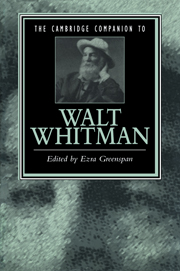Book contents
- Frontmatter
- 1 Introduction
- 2 “As If I Were With You”
- 3 Fratricide and Brotherly Love
- 4 Reading Whitman’s Postwar Poetry
- 5 Politics and Poetry
- 6 Some Remarks on the Poetics of “Participle-Loving Whitman”
- 7 “Being a Woman ... I Wish to Give My Own View”
- 8 Appearing in Print
- 9 “I Sing the Body Electric”
- 10 Walt Whitman
- 11 Borge's "Song of Myself"
- Suggestions for further reading
- Index
- Series List
11 - Borge's "Song of Myself"
Published online by Cambridge University Press: 28 May 2006
- Frontmatter
- 1 Introduction
- 2 “As If I Were With You”
- 3 Fratricide and Brotherly Love
- 4 Reading Whitman’s Postwar Poetry
- 5 Politics and Poetry
- 6 Some Remarks on the Poetics of “Participle-Loving Whitman”
- 7 “Being a Woman ... I Wish to Give My Own View”
- 8 Appearing in Print
- 9 “I Sing the Body Electric”
- 10 Walt Whitman
- 11 Borge's "Song of Myself"
- Suggestions for further reading
- Index
- Series List
Summary
Years ago, in a first attempt to describe Whitman's presence in Latin America, I said: “Studying Whitman in the poetry of Hispanic America is like searching for the footprints of a ghost that can be felt everywhere but is nowhere to be seen.”
At the University of Iowa's international meeting in homage to Whitman in 1992, once again I felt the presence of this familiar ghost. It was springtime. Observing known and unknown faces, listening to foreign accents, and deciphering allusions made with fascinating ambiguity created a certain magic among us. We were participants in a chorus that, in strange harmony, expressed the frustration of not being able to communicate all that we were saying to each other.
Then I thought that just as every generation of Whitmanists conceives a Whitman model that is characteristically related to its concept of poetic art, each culture also finds a way of translating Whitman in order to integrate him into its own conception of life.
Our Chinese colleagues explained why Whitman cannot be translated into their language in the way Westerners translate him. They gave the name of the insurmountable barrier: sex. Then I understood their long metaphorical tangents, their omissions, and their strange rhetoric. Indirectly, they were telling us that each people makes of Whitman's art an overwhelming metaphor and of his person an imposing, intricate symbol. Whitman's followers accommodate him to the size of the dream that is, in truth, his peculiar poetic art.
- Type
- Chapter
- Information
- The Cambridge Companion to Walt Whitman , pp. 208 - 220Publisher: Cambridge University PressPrint publication year: 1995
- 2
- Cited by

